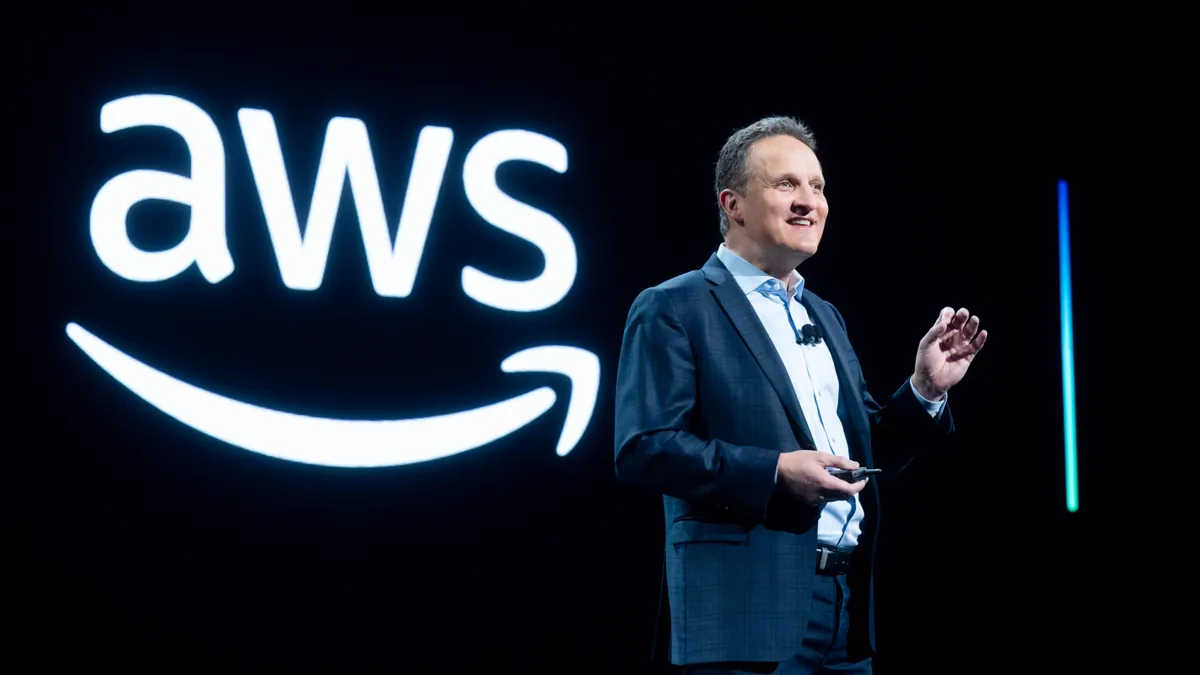Dive Brief:
- Amazon Web Services, an Amazon subsidiary that offers cloud computing services to businesses and organizations, signed a deal that aims to decarbonize its data centers and develop technologies that improve energy efficiency, it announced Monday.
- AWS entered a multi-year partnership with Orbital Materials to boost data center sustainability and incorporate artificial intelligence to support related changes, according to a Dec. 2 release. Orbital, which uses a proprietary AI platform to develop climate technologies and new materials, will help AWS design, produce and test data center components that will allow for carbon removal, chip cooling and improved water use.
- The Amazon cloud computing subsidiary also announced plans to update its data center infrastructure the same day. AWS said it would introduce new components to support innovation in AI, power, cooling and hardware design geared toward increasing energy efficiency and decreasing the carbon footprint of its data centers.
Dive Insight:
Orbital will pilot its data center carbon removal technology by the end of 2025, per Monday’s release. Orbital, which launched its lab earlier this year, said its proprietary AI platform helps develop and improve materials 10 times faster than traditional methods — a pace it said is “breaking new ground in carbon removal efficacy.”
As part of Orbital’s collaboration with AWS, the company’s open-source AI model for simulating materials, “Orb,” will also be made available to AWS customers through Amazon platforms SageMaker, JumpStart and AWS Marketplace. Orb will allow AWS customers to work on materials and technologies such as semiconductors, batteries and electronics. This access, according to AWS General Manager of Energy Utilities Howard Gefen, can “accelerate the development of breakthrough sustainability technologies.”
“By integrating Orb with [the other Amazon products], we will enable sustainable innovation more widely,” Gefen said in the Monday release. He also said the collaboration will set “new benchmarks for carbon removal and efficiency across the industry.”
In terms of data center infrastructure updates, AWS said it would upgrade its cooling system to a more efficient one. The new system is estimated to cut mechanical energy consumption by up to 46% compared to an older design being used during peak cooling conditions. The design changes will not increase water usage on a megawatt basis, per AWS’ estimate, and may include a new single-sided cooling system and the insertion of liquid cooling capabilities, according to a separate update the company shared Monday.
The update also included changes AWS is adopting to reduce the carbon stored in the concrete of the data center’s building structure by 35%, compared to an industry average. AWS aims to achieve this by using low-carbon steel and concrete, in addition to optimizing its structural design to rely on less steel overall.
In October, Amazon announced it had invested in Paebbl, which looks to store carbon dioxide in building materials, through its climate fund as part of a $25 million funding round for the startup. At the time, Amazon said Paebbl’s technology has the potential to transform the “built environment into a permanent carbon sink.” AWS would trial Paebbl’s cement-like low-carbon materials in one of the tech giant’s European data centers to provide data on the material.
AWS also joined Meta, Google and other tech giants calling for increased transparency about the lifecycle emissions for data center infrastructure earlier this year. The companies are asking that suppliers include nutrition label-like information for their products.















